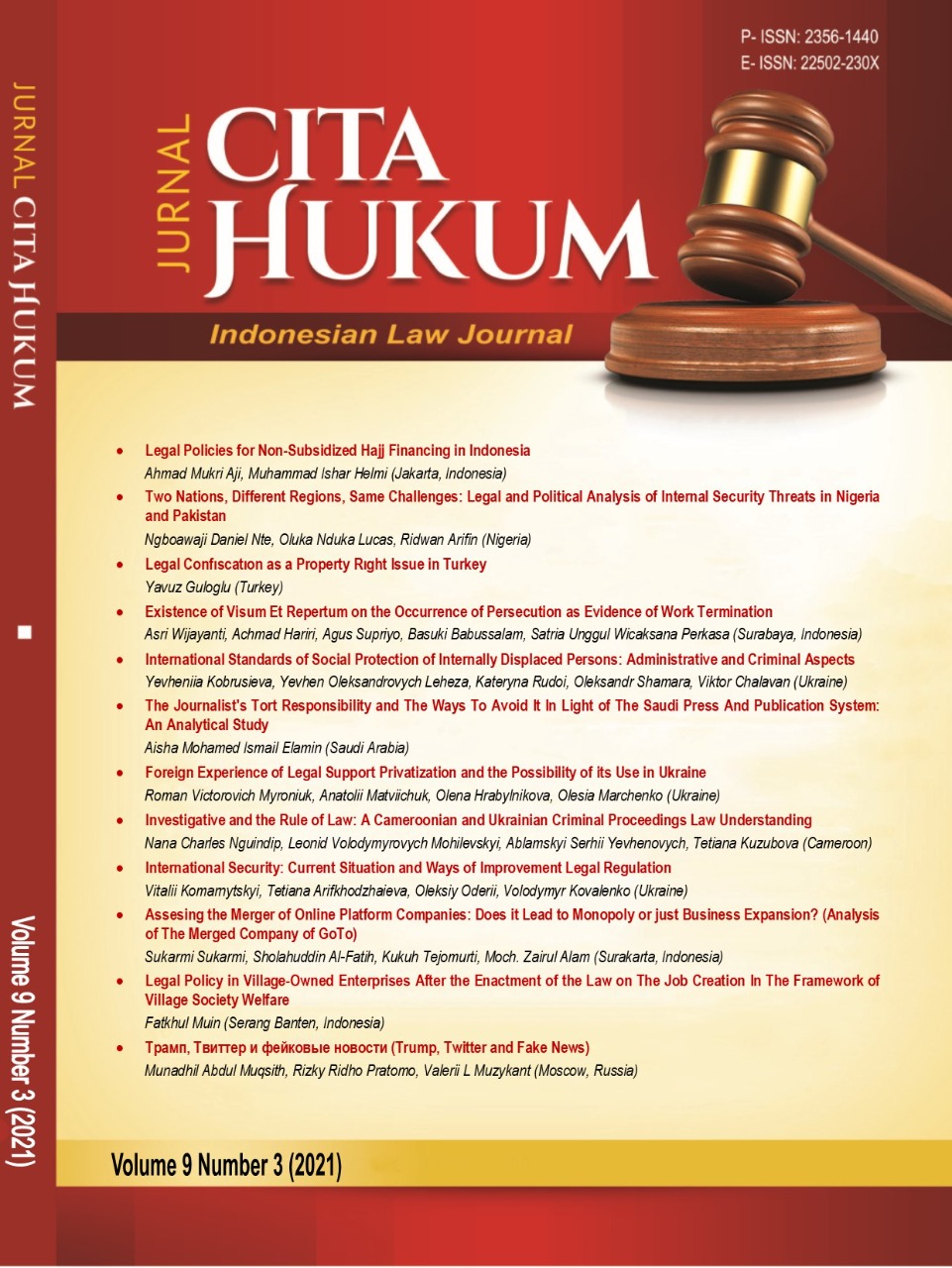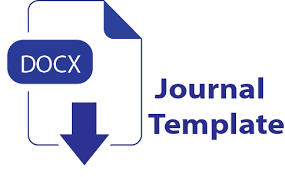Трамп, Твиттер и фейковые новости (Trump, Twitter and Fake News)
DOI:
https://doi.org/10.15408/jch.v9i3.22445Keywords:
обман, Дональд Трамп, популизм, социальные сети, ТвиттерAbstract
This study aims to provide rationality regarding Donald Trump as a fake news aggregator. Donald Trump's leadership from 2017-2020 is controversial and created a massive wave of fake news. As a populist leader, he often issued statements that confused the public during his reign, causing people's trust in the Trump administration to decline. He made the statement not only on national television but also on social media. Social media is the right political communication funnel for any populist leader when it comes to audience reach. Donald Trump is an active user especially on Twitter and uses it to spread misinformation and disinformation to spread what he calls as a truth. Many statements make Donald Trump worthy of being called a fake news aggregator. This study uses a qualitative approach with the content analysis method. Thirty-two samples of Donald Trump's hoax statements that were examined found that the hoaxes spread by him were not limited to just one topic. This research has both theoretical and practical significance. From a theoretical point of view, this research contributes to the development of literature regarding the relationship between hoaxes and populist leaders. In practical terms, this literature contributes to understanding the characteristics of populists and how social media is used as a funnel to spread hoaxes.
Keywords: Hoax; Donald Trump; Populism; social media; Twitter
Trump, Twitter and Fake News
Abstrak
Penelitian ini bertujuan untuk memberikan rasionalitas terkait Donald Trump sebagai fake news aggregator. Kepemimpinan Donald Trump pada periode 2017-2020 ini sangat kontroversial dan menciptakan sebuah gelombang fake news yang masif. Sebagai seorang pemimpin populis, dalam masa pemerintahannya, tak jarang dia mengeluarkan pernyataan yang menimbulkan kebingungan kepada masyarakat sehingga menyebabkan turunnya kepercayaan rakyat terhadap pemerintahan Donald Trump.Pernyataan itu dia lontarkan tidak hanya di media televisi nasional, tetapi juga media sosial. Bahkan, apabila berbicara jangkauan audience, media sosial menjadi corong komunikasi politik yang tepat bagi setiap pemimpin populis. Donald Trump merupakan pengguna aktif media sosial, khususnya Twitter. Donald Trump memanfaatkannya untuk menyebarkan misinformasi dan disinformasi untuk menyebarkan kebenaran versi miliknya. Ada banyak pernyataan yang membuat Donald Trump layak disebut sebagai fake news aggregator. Studi ini menggunakan pendekatan kualitatif dengan metode analisis konten. Sebanyak tiga puluh dua sampel pernyataan Donald Trump dikaji. Penulis menemukan bahwa berita bohong yang disebarkan olehnya tidak terbatas hanya satu topik semata. Penelitian ini memiliki signifikansi teoritis dan praktis. Dari segi teoritisnya, penelitian ini berkontribusi terhadap perkembangan literatur terkait hubungan antara hoaks dan pemimpin populis. Dalam segi praktisnya, literatur ini menjadi sumbangan pemikiran untuk memahami lebih lanjut karakteristik populis dan bagaimana media sosial digunakan sebagai corong untuk menyebarkan hoaks.
Kata Kunci: Hoaks; Donald Trump; Populisme; Media Sosial; Twitter
Трамп, Твиттер и фейковые новости
Аннотация
Это исследование направлено на то, чтобы дать разумное представление о Дональде Трампе как агрегаторе фейковых новостей. Руководство Дональда Трампа в период 2017-2020 годов было очень спорным и вызвало массовую волну фейковых новостей. Как лидер популистов во время своего правления он часто делал заявления, которые вызывали замешательство у общественности, вызывая снижение доверия людей к правлению Дональда Трампа. Эти заявления он делал не только по национальному телевидению, но и в социальных сетях. Фактически, когда дело доходит до охвата аудитории, социальные сети являются правильной воронкой политической коммуникации для любого лидера популистов. Дональд Трамп - активный пользователь социальных сетей, особенно Твиттера. Дональд Трамп использует его для распространения недостоверной информации и дезинформации, чтобы распространить свою версию правды. Есть много заявлений, которые делают Дональда Трампа достойным называться агрегатором фейковых новостей. В этом исследовании используется качественный подход с методом контент-анализа. Были изучены 32 образца заявлений Дональда Трампа. Автор считает, что распространяемые им фейковые новости не ограничиваются одной темой. Это исследование имеет как теоретическое, так и практическое значение. С теоретической точки зрения, это исследование способствует развитию литературы о взаимоотношениях между обманом и популистскими лидерами. На практике эта литература является вкладом в дальнейшее понимание характеристик популистов и того, как социальные сети используются в качестве канала для распространения лжи.
Ключевые слова: обман; Дональд Трамп; популизм; социальные сети; Твиттер
References
Akgül, H. (2019). Fake News as a Tool of Populism in Turkey: The Pastor Andrew Brunson Case. Polish Political Science Review., 7(2), 32-51.
Allcott, H., & Gentzkow, M. (2017). Social Media and Fake News in the 2016 Election. Journal of Economic Perspectives, 31(2), 211-36.
Arbar, T. F. (2021, 03 11). Retrieved 04 10, 2021, from https://www.cnbcindonesia.com/news/20210311092122-4-229421/geger-pemenggalan-guru-prancis-hasil-kebohongan-ini-faktanya.
Barclay, D. A. (2018). Fake News, Propaganda, and Plain Old Lies: How to Find Trustworthy Information in the Digital Age. London: Rowman & Littlefield.
BBC. (2020, 05 27). Retrieved 01 01, 2021, from https://www.bbc.com/news/technology-52815552
Bergmann, E. (2020). Populism and the Politics of Misinformation. The Journal Of South African And American Studies, 21(3), 251-265.
Buccoliero, L., Bellio, E., Crestini, G., & and Arkoudas, A. (2018). Twitter and Politics: Evidence From the US Presidential Elections 2016. Journal of Marketing Communications, 26(1), 88-114.
Carr, N. (2018, 01 26). Retrieved 01 07, 2021, from https://www.politico.com/magazine/story/2018/01/26/donald-trump-twitter-addiction-216530/
Clayton, J. (2021, 05 05). Retrieved 05 20, 2021, from https://www.bbc.com/news/technology-56989500
Coll, S. (2017, 12 03). Retrieved 01 04, 2021, from https://www.newyorker.com/magazine/2017/12/11/donald-trumps-fake-news-tactics
Crawford, K. (2017, 01 18). Retrieved 02 09, 2021, from https://news.stanford.edu/2017/01/18/stanford-study-examines-fake-news-2016-presidential-election/
Denchak, M. (2021, 02 19). Retrieved 03 01, 2021, from https://www.nrdc.org/stories/paris-climate-agreement-everything-you-need-know
Dinçer, S. (2018). Content Analysis in for Educational Science Research: Meta-Analysis, Meta-Synthesis, and Descriptive Content Analysis. Bartın University Journal of Faculty of Education, 7(1), 176-190.
Duffy, Andrew,. Tandoc, Edson., Ling, Rich. (2019). Too Good to be True, Too Good Not to Share: The Social Utility of Fake News. Information, Communication & Society, 23(13), 1965-1979.
Ecker, U., Jetter, M., & Lewandowsky, S. (2020, 11 12). Retrieved 02 14, 2021, from https://theconversation.com/how-trump-uses-twitter-to-distract-the-media-new-research-149847
Figueira, A., & Oliveira, L. (2017). The current state of fake news: challenges and opportunities. CENTERIS - International Conference on ENTERprise Information Systems. Barcelona.
Gallup. (2017, 01 19). Retrieved 02 04, 2021, from https://news.gallup.com/poll/116479/barack-obama-presidential-job-approval.aspx.
Gallup. (2021, 01 15). Retrieved 03 04, 2021, from https://news.gallup.com/poll/203198/presidential-approval-ratings-donald-trump.aspx
Gore, D. (2018, 05 22). Retrieved 05 01, 2021, from https://www.khou.com/article/news/nation-now/fact-check-trump-wrongly-blames-democrats-for-his-border-policy-of-separating-families/465-1d87a155-eb69-457a-985a-30c83d26745b
Hendricks, J., & Schill, D. (2017). "The Social Media Election of 2016," in The 2016 US Presidential Campaign. London: Palgrave McMillan.
Humphrey, M. (2021, 02 08). Retrieved 03 05, 2021, from https://theconversation.com/i-analyzed-all-of-trumps-tweets-to-find-out-what-he-was-really-saying-154532
Jacobson, L. (2019, 05 07). Retrieved 02 09, 2021, from https://www.politifact.com/factchecks/2019/may/07/viral-image/fact-checking-joe-biden-hunter-biden-and-ukraine/
Jamieson, A. (2017, 01 11). Retrieved 12 12, 2020, from https://www.theguardian.com/us-news/2017/jan/11/trump-attacks-cnn-buzzfeed-at-press-conference
Keith, T. (2019, 01 11). Retrieved 02 10, 2021, from https://www.npr.org/2019/01/11/683920624/once-a-fence-later-slats-almost-always-a-wall-trumps-border-wall-contradictions
Kellner, D. (2018). Donald Trump and the Politics of Lying. In Post-Truth, Fake News (pp. 89-100). Singapore: Springer.
Kleinheksel, A., Rockich-Winston, N., Tawfik, H., & Wyatt, T. R. (2020). Qualitative Research in Pharmacy Education: Demystifying Content Analysis. American Journal of Pharmaceutical Education, 84(1), 127-137.
Knight Foundation. (2018). Americans' Views of Misinformation in the News and How to Counteract it. Florida: Knight Foundation.
Lemire, J., Miller, Z., & and Weissert, W. (2020, 11 08). Retrieved 01 15, 2021, from https://apnews.com/article/joe-biden-wins-white-house-ap-fd58df73aa677acb74fce2a69adb71f9
Levitz, E. (2017, 06 09). Retrieved 04 01, 2021, from https://nymag.com/intelligencer/2017/06/every-terrifying-thing-that-donald-trump-has-done.html
Lewandowsky, S., Jetter, M., & and Ecker, U. K. (2020). Using the President’s Tweets to Understand Political Diversion In the Age of Social Media. Nature Communications, 11, 1-12.
Lippert, T. (2016). NATO, Climate Change, and International Security. RAND Corporation.
Maldonado, M. (2019). Understanding Fake News: Technology, Affects, and the Politics of the Untruth. Historia comunicación social, 24(2), 533-546.
McCarthy, N. (2021, 01 12). Retrieved 03 04, 2021, from https://thewire.in/world/donald-trump-twitter-chart
Mitchell, A., & Gottfried, J. G. (2019, 06 15). Retrieved 02 14, 2021, from https://www.journalism.org/2019/06/05/many-americans-say-made-up-news-is-a-critical-problem-that-needs-to-be-fixed/
Morris, J. (2020). Simulacra in the Age of Social Media: Baudrillard as the Prophet of Fake News. Journal of Communication Inquiry.
Muqsith, M., Muzykant, V., Pratomo, R., & Setiawan, R. (2020). Media Discourse of Roots Causes and Security Perspectives on Climate Change. International Journal of Progressive Sciences and Technologies, 23(1), 300-310.
Muqsith, M., Pratomo, R. R., Kuswanti, A., & Muzykant, V. (2021). Social solidarity movement to prevent the spread of COVID-19 pandemic in Indonesia. Journal Masyarakat, Kebudayaan dan Politik, 34(2), 147-158.
Nusselder, A. (2013). Twitter and the Personalization of Politics. Psychoanalysis, Culture & Society, 18, 91-100.
Pain, P., & CHen, G. (2019). The President Is in: Public Opinion and the Presidential Use of Twitter. Social Media + Society, 5(2), 1-12.
Pew Research Center. (2021, 01 20). Retrieved 04 05, 2021, from https://www.pewresearch.org/2021/01/29/how-america-changed-during-donald-trumps-presidency/
Pew Research Center Logo. (2020, 02 21). Retrieved 01 05, 2021, from https://www.pewresearch.org/internet/2020/02/21/concerns-about-democracy-in-the-digital-age/
Quandt, T., Frischlich, L., Boberg, S., & & Schatto‐Eckrodt, T. (2019). "Fake News," in The International Encyclopedia of Journalism Studies. New Jersey,: John Wiley & Sons, Inc.
Robertson, A. (2019, 12 03). Retrieved 01 02, 2021, from https://www.theverge.com/21276897/fake-news-facebook-twitter-misinformation-lies-fact-check-how-to-internet-guide
Roca-Cuberes, C., & Young, A. (2020). Vox Populi? Trump’s Twitter Page as Public Forum. MDPI Social Sciences, 9, 226.
Rosenberg, B., Williams, T. R., & and nimashaun, C. A. (2020, 11 09). Retrieved 02 03, 2021, from https://www.vox.com/2020/11/8/21550345/50-million-confirmed-cases-covid-19-worldwide
Sacchetti, M. (2021, 04 11). Retrieved 05 01, 2021, from https://www.washingtonpost.com/immigration/congress-citizenship-legislation/2021/04/09/e0f32e4c-8dbd-11eb-9423-04079921c915_story.html
Salkowitz, R. (2017, 01 17). Retrieved 12 12, 2020, from https://www.forbes.com/sites/robsalkowitz/2017/01/17/trumps-20-million-twitter-followers-get-smaller-under-the-microscope/?sh=7f3d8d954407
Schroeder, R. (2019). Digital Media and the Entrenchment of Right-Wing Populist Agendas. Social Media + Society.
Snith, T. (2020, 11 11). Retrieved 05 21, 2021, from https://abcnews.go.com/Politics/trump-longstanding-history-calling-elections-rigged-doesnt-results/story?id=74126926
Somu, S. (2020, 07 17). Retrieved 05 21, 2021, from https://jakartaglobe.id/opinion/wrong-to-use-china-as-scapegoat-for-covid19
Tandoc, E. J. (2018). Defining ‘Fake. Digital Journalism, 6(2), 137–153.
Tsfati, Y., Boomgaarden, H., Strömbäck, J., Vliegenthart, R., Damstra, A., & and Lindgren, E. (2020). Causes and Consequences of Mainstream Media Dissemination of Fake News: Literature Review and Synthesis. Annals of the International Communication Association.
van der Linden, S. P. (2020). You are fake news: political bias in perceptions of fake news. Media, Culture & Society, 42(3), 460–470.
Wakefield, J. (2021, 03 25). Retrieved 04 02, 2021, from https://www.bbc.com/news/technology-56523378
Walsh, T. (2017, 01 06). Retrieved 12 15, 2020, from https://www.usnews.com/news/ken-walshs-washington/articles/2017-01-06/trump-uses-twitter-as-strategic-weapon
Wang, M., Rao, M., & and Sun, Z. (2020). Typology, Etiology, and Fact-Checking: A Pathological Study of Top Fake News in China. Journalism Practice, 1-20.
Wardle, C., & Derakhshan, D. H. (2017). INFORMATION DISORDER: Toward an interdisciplinary framework for research and policy making. Strasbourg Cedex: the Council of Europe.
Whitling, A., & Williams, D. (2013). Why people use social media: a uses and gratifications approach. Qualitative Market Research: An International Journal, 16(4), 362-369.
Wilson, V. (2016). Research Methods: Content Analysis. Evidence Based Library and Information Practice, 11(1), 177-179.
Woodward, A. (2020, 10 02). Retrieved 03 04, 2021, from https://www.independent.co.uk/news/world/americas/us-election/trump-fake-news-counter-history-b732873.html
WORLAND, J. (2016, 10 04). Retrieved 02 01, 2021, from https://time.com/4517326/climate-change-public-opinion/
Zúñiga, H. G. (2020). Populism in the era of Twitter: How social media contextualized new insights into an old phenomenon. New Media & Society, 22(4), 585-594.











